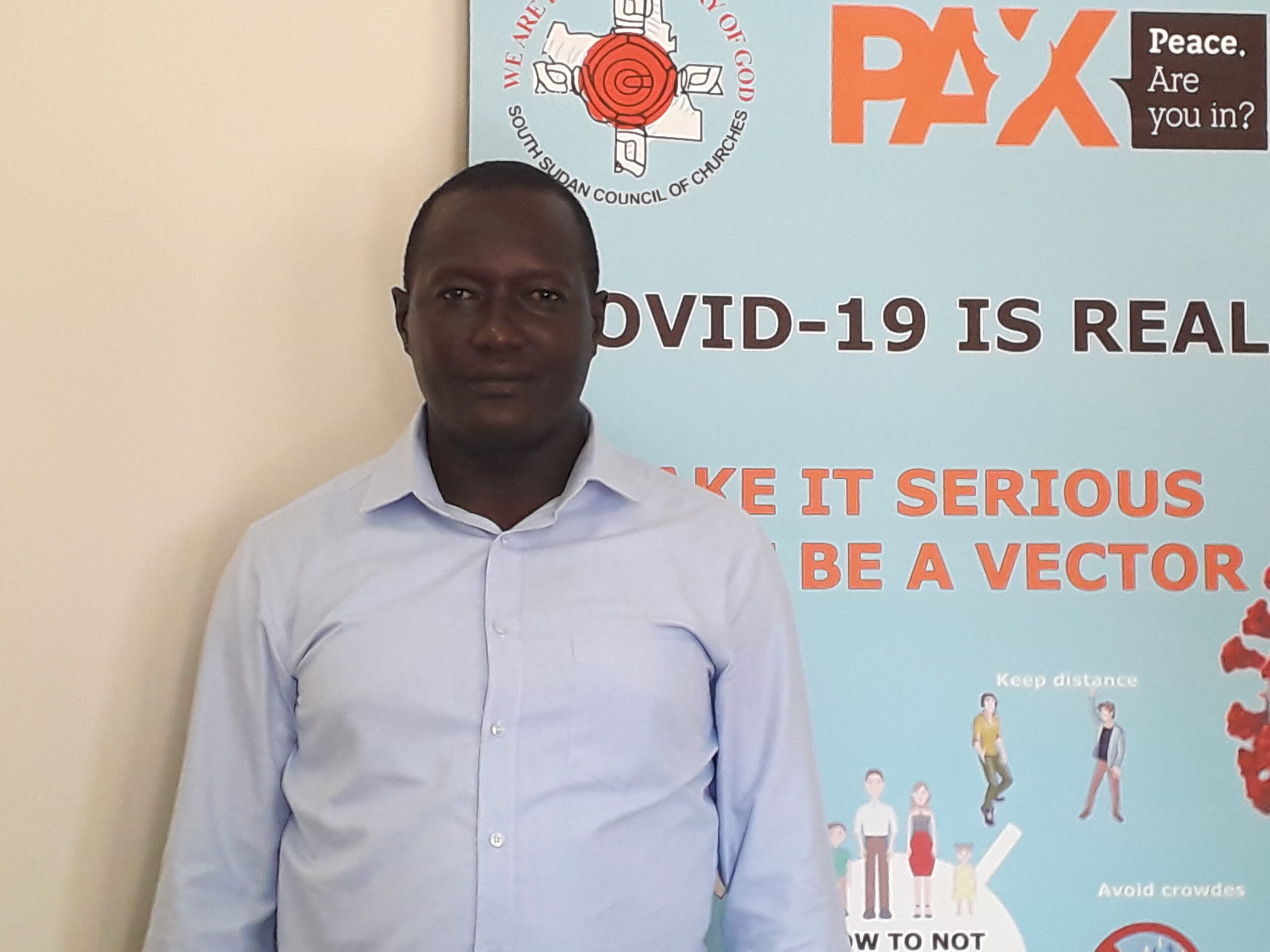Emmanual Ira is the Country Director for PAX South Sudan office, where he works to support partners on various projects throughout South Sudan. Last month, he was visiting the Netherlands to meet with the Dutch Council of Churches, IKV-PAX Christi, several of our partners, and staff of the Ministry of Foreign Affairs, our strategic partner within the Power of Voices program of 2021-2025. PAX talked with Emmanuel about his work.
Can you tell us some more about the situation in South Sudan?
South Sudan has not yet established sustainable peace as there are different types of conflicts, and violence between communities and amongst communities under the revitalised peace agreement (RARCSS). Moreover, there are skirmishes between government organized forces and rebel forces who are not part of the revitalized peace agreement (RARCSS). The most pressing issues are the deep trauma within all layers of the society, a closing civic space, lack of political will and a painfully slow implementation of the peace agreement which is coming to an end early 2023.
How does your work contribute to improving peace in South Sudan?
Our work continues to transform the grassroots by mitigating the intra- and intercommunal violence, by building peace from the bottom up. Moreover, we continue to engage in evidence-based advocacy research at the various levels for the peaceful resolution of conflicts. We continue to create and support space for communities and armed actors to have dialogues that lead to reconciliation. Additionally, other interventions like Human Security Surveys, enable us to gather the perceptions of most pressing security needs of the community and come up with priorities for interventions to authorities and stakeholders.
What is necessary for peace in South Sudan?
We need public programs that create impact and that need to be supported further. For example, the Action Plan for Peace (APP) is a home-grown solution to the conflict in South Sudan. Led by the church leaders in South Sudan under the United body of the South Sudan Council of Churches (SSCC), it mitigated a similar situation as which happened in Rwanda in 1994, the Rwandan Genocide. The APP has been acknowledged and accepted as a process and not a project towards sustainable peace in South Sudan. Moreover, this process is focused on the long term instead of the short term, but this means that it requires patience and continued commitment, especially in terms of financial support. It is also seen as the only window of hope in South Sudan, as long as the church is in the driving seat.
How did the SSCC manage to mitigate a similar situation as the Rwandan Genocide?
At different levels, church leaders engage in diplomacy preventing conflicts from escalating, promoting reconciliation processes in different locations and easing tensions, for example between political leaders. For example, in 2019 their efforts led to a remarkable meeting of political and church leaders in the Vatican, where the Pope kissed the feet of the antagonistic leaders. This meeting was critical as it kept the political leaders talking and engaging in the Addis Ababa peace process, that was reinvigorated by the APP.
Many people in South Sudan look to the church for leadership and guidance because it has a track record in supporting the cause of the people in South Sudan during the independence and civil wars. The church leads on key issues like truth, reconciliation and healing, sustainable peace, justice, and inclusive governance. It is also a strong advocate for social inclusion in complex conflicts, like land-disputes. From international advocacy to providing rudimentary education and mediating in conflicts, church leaders foster peace all over South Sudan, from under a tree in the smallest village to the highest international levels.
How does the APP help to reach peace in South Sudan?
As a paper agreement will not heal and reconcile traumatized communities after decades of war, the APP includes 4 strategic areas of action that contribute and complement the formal implementation of the peace agreement (RARCSS):
1) Advocacy at different levels to influence policies and change the public narrative;
2) Reconciliation, trauma healing, and the restoration of right relationships, through leveraging the church values of forgiveness and personal transformation;
3) Facilitating neutral forums to bring together stakeholders in a less politically charged atmosphere with an aim of overcoming mistrust and disagreement;
4) Strengthened the Inter-church and Interfaith Forums for Effective Implementation of the South Sudan Council of Churches’ Action Plan for Peace.
What does PAX do to help the APP succeed?
PAX provides technical support to the SSCC and takes active part in the APP core group with international partners to coordinate the APP work. We collaborate with our local partners, provide capacity building and advice on advocacy messaging and strategic positioning. PAX has worked in South Sudan for quite some time, which means there is role to play in networking and providing knowledge and experience to newcomers such as diplomats.
What do you wish from the Dutch government and people to help improving peace in South Sudan?
We wish for the Dutch government to have South Sudan as a priority on their agenda, as the new situation is making South Sudan to be forgotten more easily compared to before the independence of South Sudan in 2011. Now, the focus is more on the current conflict of Ukraine and Russian. Hence, we urge the Dutch government to continue to accompany South Sudan in achieving sustainable peace through supporting home-grown peace interventions, such as the church-led Action Plan for Peace with three pillars of support: trauma healing and reconciliation, neutral forums bringing warring parties together and advocacy work as well as development aid for more pressing humanitarian needs. Particularly, there are now more severe needs created by natural calamities like flooding and famine.




